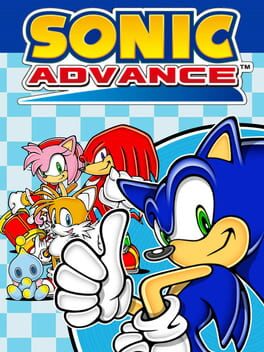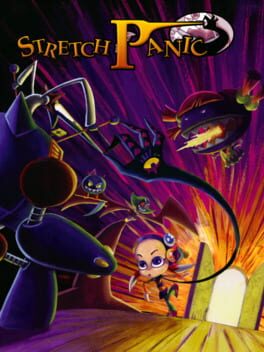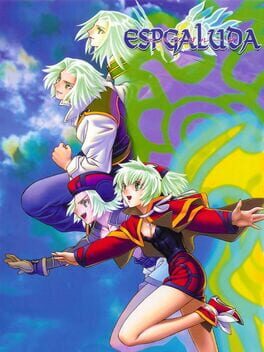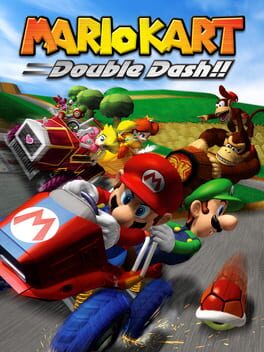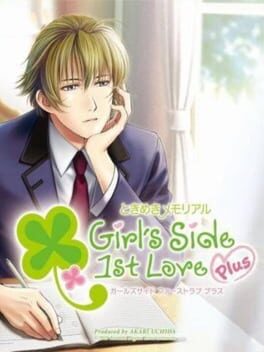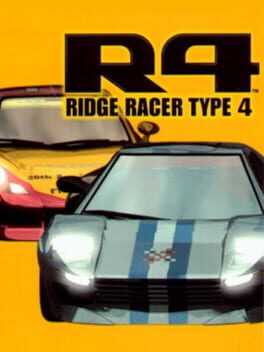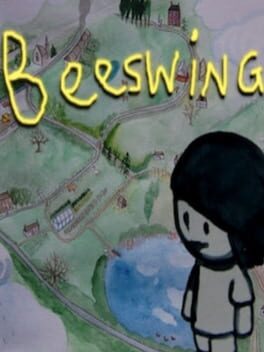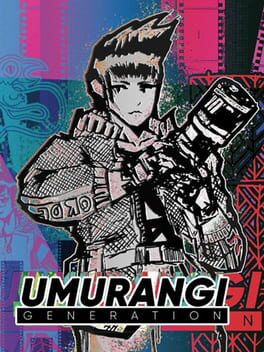oneiromantic
2016
2023
I've seen jam games with more thought and polish put into them than this
I kept clipping out of bounds bc I chose the speed upgrades in the game where your health constantly goes down over time, so I would go too fast and phase through the walls, which would then kill me bc I wouldn't have enough time to build up speed and clip back in-bounds. it's entirely possible this game was not tested at all
I kept clipping out of bounds bc I chose the speed upgrades in the game where your health constantly goes down over time, so I would go too fast and phase through the walls, which would then kill me bc I wouldn't have enough time to build up speed and clip back in-bounds. it's entirely possible this game was not tested at all
2001
2001
2003
1995
1999
2012
2022
I first became aware of the depth the Tokimeki Memorial games are known for through the Tim Rogers video essay on the first game in the franchise. However, since my Japanese knowledge is nothing to write home about, I’m only capable of playing the DS releases of the Girl’s Side spinoffs, since at the time of writing those are the only ones with English patches available (barring a translation of the SNES port of the original, ie the worst version). That’s just fine; I like men and have been known to admire many 2D ones in my time.
But you know what? Even going into the experience expecting something much closer to an RPG than a VN, I was ill-prepared for the socially anxious labyrinth of a videogame that is Tokimeki Memorial: Girl’s Side Plus. It has this solid foundation of your daily actions building up or ticking down various stats based on RNG as well as more long-term decisions like where you work part-time or what club you join at school. The real meat of the game lies in what’s laid on top of these, though.
In addition to actually romancing the anime boys themselves, you can also befriend them to varying degrees in addition to 4 girls that you can hang out with at any time without prior planning (and apparently if you get close enough you can get a quasi-lesbian ending). You can also get a random chance of taking any of these characters to a cafe after school to have a casual conversation with them (that I think also helps out their feelings for you?) or to walk home with you (which offers no information about them but definitely makes them like you more), before which you can call out to them by one of 10 nickname and honorific combinations. Also if you’re close but not close enough with a guy and have befriended a girl well enough she might start to go after him herself and you have to either start being mean to her and chase after the guy desperately or give up on that guy ever dating you again.
There’s also an entire metagame where you can go out to buy clothes on days where you could otherwise be calling someone or going on a date, and you can improve your dates themselves by wearing outfits that are in fashion or give off a certain vibe that each of the boys will react differently to, but it has to be suitable for the time of year or else they’ll give you a funny look.
You probably get the idea by now: the game is just chock full of interlocking systems like these, it’s mind-blowing. Even though you’re only presented with a small number of options at any given time, the depth in considering what your optimal move is remains enthralling for the entire run of the game.
Its design is brilliantly mathy and some SMT-level nonsense clearly went into its balance. In the final month of the game I got totally checkmated where my best friend suddenly became a rival with my for Sakuya Morimura, my favorite of the crowd. I was on track to get at the end if I could avoid offending any of the other boys too badly. The event where she was scripted to take him from me was set for a date too close to any of my saves for me to be able to take him on enough dates to prevent it by making him like me enough. My avatar narrated to herself: “Well, Arisawa-san finally told Morimura-kun about her feelings.” I rolled back my save to play the final 2 months of the game repeatedly, the protagonist always gratingly happy for her dear friend Shiho Arisawa.
Ultimately, she got into a first-rate university and graduated without being too close to anyone romantically OR platonically. Story of my fuckin’ life! Jorge Luis Borges could never.
But you know what? Even going into the experience expecting something much closer to an RPG than a VN, I was ill-prepared for the socially anxious labyrinth of a videogame that is Tokimeki Memorial: Girl’s Side Plus. It has this solid foundation of your daily actions building up or ticking down various stats based on RNG as well as more long-term decisions like where you work part-time or what club you join at school. The real meat of the game lies in what’s laid on top of these, though.
In addition to actually romancing the anime boys themselves, you can also befriend them to varying degrees in addition to 4 girls that you can hang out with at any time without prior planning (and apparently if you get close enough you can get a quasi-lesbian ending). You can also get a random chance of taking any of these characters to a cafe after school to have a casual conversation with them (that I think also helps out their feelings for you?) or to walk home with you (which offers no information about them but definitely makes them like you more), before which you can call out to them by one of 10 nickname and honorific combinations. Also if you’re close but not close enough with a guy and have befriended a girl well enough she might start to go after him herself and you have to either start being mean to her and chase after the guy desperately or give up on that guy ever dating you again.
There’s also an entire metagame where you can go out to buy clothes on days where you could otherwise be calling someone or going on a date, and you can improve your dates themselves by wearing outfits that are in fashion or give off a certain vibe that each of the boys will react differently to, but it has to be suitable for the time of year or else they’ll give you a funny look.
You probably get the idea by now: the game is just chock full of interlocking systems like these, it’s mind-blowing. Even though you’re only presented with a small number of options at any given time, the depth in considering what your optimal move is remains enthralling for the entire run of the game.
Its design is brilliantly mathy and some SMT-level nonsense clearly went into its balance. In the final month of the game I got totally checkmated where my best friend suddenly became a rival with my for Sakuya Morimura, my favorite of the crowd. I was on track to get at the end if I could avoid offending any of the other boys too badly. The event where she was scripted to take him from me was set for a date too close to any of my saves for me to be able to take him on enough dates to prevent it by making him like me enough. My avatar narrated to herself: “Well, Arisawa-san finally told Morimura-kun about her feelings.” I rolled back my save to play the final 2 months of the game repeatedly, the protagonist always gratingly happy for her dear friend Shiho Arisawa.
Ultimately, she got into a first-rate university and graduated without being too close to anyone romantically OR platonically. Story of my fuckin’ life! Jorge Luis Borges could never.
1999
1998
When I was little, I played an inordinate amount of Car Simulators which we could charitably refer to as “games”. These days I could drive a real car if I wanted to (I typically don’t), so the genre’s lost most of its luster.
R4, however, now THAT’S something I can call a racing game. The notion of automobile racing isn’t much more than a pretext for its kinesthetic virtuosity. You tap the brakes while turning and instantly turn 90 degrees while nearly maintaining your speed. You bump into an opponent in the final stretch and both of your cars fly away from each other like a child throwing a hot wheels across their bedroom. Every other car in the race jets out ahead of you at Mach 2 at the start only to slow down to a light jog, speeding back up to the same clip as you when you get close.
It’s giddily surreal; you’re not playing as someone driving a car, but someone daydreaming about doing so. It’s easier to say you like that sort of game than it is to even comprehend how to make one. Behind the scenes at Namco, some probably-underpaid systems designers painstakingly tweaked to perfection every little variable controlling the accelerations which make up that Sweet, Sweet Friction. That is to say, at least by 1999 videogames had come absolutely fucking nowhere since Pac-Man.
Of course, this would all feel sort of sterile if not for its similarly remarkable presentation. It’s got the most delightful UI I’ve seen in any game not named “Persona 5”, a soundtrack so legendary even JPEGMAFIA has sampled it, and its low-poly style oozes with charm to this day. Even the writing is pleasantly surprising, being at least as enjoyable as a sports movie you’d put on in the background while doing something else. Your coach goes through one of a few slightly different character arcs depending on how well you do in each of the campaign races, and there’s enough dialogue written that this always provides a cohesive storyline more or less unique to your performance (in my experience, anyways).
I understand why someone might be looking at these reviews skeptical of the unanimous praise heaped on this game, but my god dude it really is just that good.
R4, however, now THAT’S something I can call a racing game. The notion of automobile racing isn’t much more than a pretext for its kinesthetic virtuosity. You tap the brakes while turning and instantly turn 90 degrees while nearly maintaining your speed. You bump into an opponent in the final stretch and both of your cars fly away from each other like a child throwing a hot wheels across their bedroom. Every other car in the race jets out ahead of you at Mach 2 at the start only to slow down to a light jog, speeding back up to the same clip as you when you get close.
It’s giddily surreal; you’re not playing as someone driving a car, but someone daydreaming about doing so. It’s easier to say you like that sort of game than it is to even comprehend how to make one. Behind the scenes at Namco, some probably-underpaid systems designers painstakingly tweaked to perfection every little variable controlling the accelerations which make up that Sweet, Sweet Friction. That is to say, at least by 1999 videogames had come absolutely fucking nowhere since Pac-Man.
Of course, this would all feel sort of sterile if not for its similarly remarkable presentation. It’s got the most delightful UI I’ve seen in any game not named “Persona 5”, a soundtrack so legendary even JPEGMAFIA has sampled it, and its low-poly style oozes with charm to this day. Even the writing is pleasantly surprising, being at least as enjoyable as a sports movie you’d put on in the background while doing something else. Your coach goes through one of a few slightly different character arcs depending on how well you do in each of the campaign races, and there’s enough dialogue written that this always provides a cohesive storyline more or less unique to your performance (in my experience, anyways).
I understand why someone might be looking at these reviews skeptical of the unanimous praise heaped on this game, but my god dude it really is just that good.
2014
I’m going to level with you: I don’t really know what Beeswing is trying to say. There’s a couple of overarching narratives which are thoughtfully executed in their own ways, and a few locations you can explore to encounter a more self-contained story within these other narratives. I thoroughly enjoyed all of these (exploring the retirement home nearly brought me to tears) but I struggle to identify what, if anything, ties together all of the ideas this game throws at you.
It seems to be more of a memoir than anything else, so my best guess is that the lack of cohesion is sort of the point. It’s trying to capture a confusing melancholy its creator felt visiting his hometown, full of others’ stories climaxing with or without his presence. We only get occasional glimpses into the author’s actual memories of the people we meet and the places we go, mostly through what other people reminisce about with him. The town of Beeswing itself, it seems, is growing as distant from him as he is from it.
Accordingly, most of the game is composed of the perspectives of its current residents instead. There’s tons of cleanly-written vignettes hidden away about whatever happens to be on any given character’s mind, and the ones that stuck with me have stuck with me crystal-clear for the 3 months that have passed since I played this game. Many of these start to delve into more surreal territory than you might anticipate (hence why I would hesitate to call it “just” a memoir), and this sort of flexibility in its tone and style feels natural when paired with the variety in its artstyles and the eclectic range of genres spanned by its OST.
If only that stylistic diversity extended to its gameplay, too! It doesn’t ruin the game for me or anything, since the content of the game is extraordinarily well-executed for what it is, but there’s a certain je ne sais quoi to the limited ways you can interact with the game which prevent me from getting immersed beyond a certain point. It makes me feel more like I’m watching the game happen in front of me more than I’m present for it, and I get the sense that alienating feeling isn’t entirely what King-Spooner was going for. I don’t really know how to solve this kinda crippling issue in any way, but then again I’m the idiot who doesn’t get what it’s saying in the first place.
It seems to be more of a memoir than anything else, so my best guess is that the lack of cohesion is sort of the point. It’s trying to capture a confusing melancholy its creator felt visiting his hometown, full of others’ stories climaxing with or without his presence. We only get occasional glimpses into the author’s actual memories of the people we meet and the places we go, mostly through what other people reminisce about with him. The town of Beeswing itself, it seems, is growing as distant from him as he is from it.
Accordingly, most of the game is composed of the perspectives of its current residents instead. There’s tons of cleanly-written vignettes hidden away about whatever happens to be on any given character’s mind, and the ones that stuck with me have stuck with me crystal-clear for the 3 months that have passed since I played this game. Many of these start to delve into more surreal territory than you might anticipate (hence why I would hesitate to call it “just” a memoir), and this sort of flexibility in its tone and style feels natural when paired with the variety in its artstyles and the eclectic range of genres spanned by its OST.
If only that stylistic diversity extended to its gameplay, too! It doesn’t ruin the game for me or anything, since the content of the game is extraordinarily well-executed for what it is, but there’s a certain je ne sais quoi to the limited ways you can interact with the game which prevent me from getting immersed beyond a certain point. It makes me feel more like I’m watching the game happen in front of me more than I’m present for it, and I get the sense that alienating feeling isn’t entirely what King-Spooner was going for. I don’t really know how to solve this kinda crippling issue in any way, but then again I’m the idiot who doesn’t get what it’s saying in the first place.
2020
One of the best satires I've ever played, Umurangi Generation is pointed, angry, and timely. You play as some kid making their living as a photographer, with some basic requests of subjects for photos and a couple of ways to earn bonuses. It all feels a little boring, though. You're making, like, $3 per photo anyways and there's no need for it to be in focus or anything like that in the first place. The game occasionally presents some interesting challenges in the forms of using certain lenses to get into the right position to line up a particular shot, but fundamentally it's clearly not what you're supposed to be focusing on.
What, then, is the focus? Well, really whatever you feel like photographing. The game can save your photos to your computer (or your SD card if you're playing the Switch version) and is clearly trying to goad you into taking pictures that you think are beautiful, or at least something you'd want to share with others. Its goal is to present you with an interesting world filled with things to say and frame.
The cool part, though, is how thoroughly realized your camera is as an object. I love the variety of the lenses it gives you and the ways you get to apply it, like one level where your visibility is limited due to it being a warzone, but you can get a closer look at your surroundings by snapping a photo and raising the exposure way up. It makes the camera feel like an extension of your character’s body, which is the highest standard a “photography game” can aspire to.
In terms of Umurangi Generation as a game in general, however, there’s still some hiccups. For one thing, it does the Katamari thing where most locations are supposed to feel realistic, yet they’re all covered in this thick smegma of trash littered across every square foot of the ground. What’s the angle here, exactly? That neoliberalism doesn’t provide adequate garbage collection, either? Or is it just to obscure the objects you’re looking for in order to fulfill level objectives? It’s got a similar issue with exposition: typically the game’s use of environmental storytelling is exemplary, but rather frequently you still see some graffiti that’ll say some shit like “THE UN IS ACTUALLY AN IMPERIALIST PRESENCE”. It makes me wish the game just had some dialogue instead. Maybe you’d get some conversations with the protagonist’s friends you’d get to read in between levels or something, since in its current form you just get this tactless immersion-breaking nonsense getting in the way of an otherwise excellent story.
I cannot stress enough that these are nothing more than hiccups; they’re blemishes on one of the most memorable games of the last few years. There’s a deeply realized culture to observe within the painstakingly detailed world that you come to explore. Innumerable RPG towns and AAA “prestige tours” are put to shame with the sheer scale of Life contained in Umurangi Generation’s little finger. And yet, there’s something even more remarkable in the absolute direction of the game, the way it manages to move you to feel one particular way about this world and understand what formed it. In summation: videogames own, dude
What, then, is the focus? Well, really whatever you feel like photographing. The game can save your photos to your computer (or your SD card if you're playing the Switch version) and is clearly trying to goad you into taking pictures that you think are beautiful, or at least something you'd want to share with others. Its goal is to present you with an interesting world filled with things to say and frame.
The cool part, though, is how thoroughly realized your camera is as an object. I love the variety of the lenses it gives you and the ways you get to apply it, like one level where your visibility is limited due to it being a warzone, but you can get a closer look at your surroundings by snapping a photo and raising the exposure way up. It makes the camera feel like an extension of your character’s body, which is the highest standard a “photography game” can aspire to.
In terms of Umurangi Generation as a game in general, however, there’s still some hiccups. For one thing, it does the Katamari thing where most locations are supposed to feel realistic, yet they’re all covered in this thick smegma of trash littered across every square foot of the ground. What’s the angle here, exactly? That neoliberalism doesn’t provide adequate garbage collection, either? Or is it just to obscure the objects you’re looking for in order to fulfill level objectives? It’s got a similar issue with exposition: typically the game’s use of environmental storytelling is exemplary, but rather frequently you still see some graffiti that’ll say some shit like “THE UN IS ACTUALLY AN IMPERIALIST PRESENCE”. It makes me wish the game just had some dialogue instead. Maybe you’d get some conversations with the protagonist’s friends you’d get to read in between levels or something, since in its current form you just get this tactless immersion-breaking nonsense getting in the way of an otherwise excellent story.
I cannot stress enough that these are nothing more than hiccups; they’re blemishes on one of the most memorable games of the last few years. There’s a deeply realized culture to observe within the painstakingly detailed world that you come to explore. Innumerable RPG towns and AAA “prestige tours” are put to shame with the sheer scale of Life contained in Umurangi Generation’s little finger. And yet, there’s something even more remarkable in the absolute direction of the game, the way it manages to move you to feel one particular way about this world and understand what formed it. In summation: videogames own, dude


